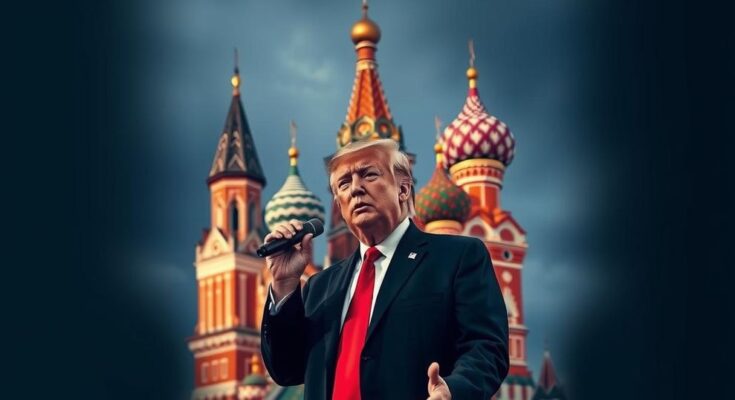Moscow’s optimism regarding Donald Trump’s potential re-election is markedly subdued compared to 2016, following a disillusionment stemming from his presidency. While some Russians initially celebrated Trump’s election, the imposition of sanctions and rising tensions under Biden have fostered caution and skepticism. Amidst divergent public views, a tightly contested US election could benefit the Kremlin by distracting from foreign policy engagements, particularly concerning Ukraine.
In the realm of international relations, Moscow’s perception of a potential second term for Donald Trump has evolved significantly since his initial election in 2016. During that time, Russian officials and nationalist politicians expressed great optimism about a renewed US-Russian rapport, highlighted by extravagant celebrations such as the purchase of 132 bottles of champagne by Vladimir Zhirinovsky, a prominent ultranationalist politician, to toast Trump’s victory. Many in Russia believed Trump would alleviate sanctions against their country and possibly endorse the annexation of Crimea. However, as his presidency progressed, expectations turned sour, especially when Trump implemented stringent sanctions against Russia, disappointing those who had initially celebrated his election. Presently, Russian officials are exhibiting a more cautious approach regarding Trump’s potential re-election. President Vladimir Putin’s veiled endorsement of the Democratic candidate, characterized as a Kremlin joke, illustrates this shift in sentiment. Putin has notably praised Kamala Harris’s laughter, yet it is Trump’s critical stance toward US military support for Ukraine that likely resonates more favorably in the Kremlin. While Trump appears reluctant to assign blame to Russia for its aggressive actions, Harris has been unequivocally critical of Putin. It is crucial to recognize that a tightly contested election in the United States might play into the Kremlin’s favor, as a distracted America grapples with post-election turmoil could shift focus away from foreign affairs, particularly the ongoing war in Ukraine. Current dynamics leave US-Russian relations diminished, with recent escalations exacerbating tensions under the Biden administration. The once-promising notion of US-Russian partnership during the Reagan-Gorbachev era now seems a distant memory. The Russian public’s perception of America varies, with some holding onto historical grievances while others remain hopeful for friendship and understanding. Public commentary near a duck sculpture symbolizing US-Russian relations reveals a spectrum of views, from deep-seated mistrust to calls for peace and collaboration. As the US election approaches, how it reverberates through foreign opinion remains to be seen, underscoring the complexities of diplomatic relationships.
The article explores the nuanced perspectives held by Moscow and its officials regarding Donald Trump’s potential return to the presidency, contrasting past exuberance coinciding with his initial election in 2016 to the current cautious stance. Trump’s first term involved unexpected developments and disappointments for Russia, such as the imposition of heavy sanctions and military support for Ukraine under the Biden administration, leading now to a reluctant acknowledgment of a complicated political landscape between the United States and Russia. This analysis emphasizes the historical context of US-Russian relations and the citizens’ varied perspectives on their countries’ interactions.
In conclusion, Vladimir Putin and the Russian government exhibit caution regarding Donald Trump’s prospective presidency, shaped by past experiences and evolving geopolitical dynamics. While there was initial optimism surrounding Trump’s election, the subsequent imposition of sanctions and the ongoing support for Ukraine under the Biden administration have altered the narrative. Reflecting on the implications of a closely contested US election, it is evident that Russia is closely monitoring developments, with public opinion mirroring the complex historical and contemporary attitudes towards America. The article encapsulates the duality of hope and skepticism present in Russian sentiments as they navigate the unpredictable terrain of US politics.
Original Source: www.bbc.com




